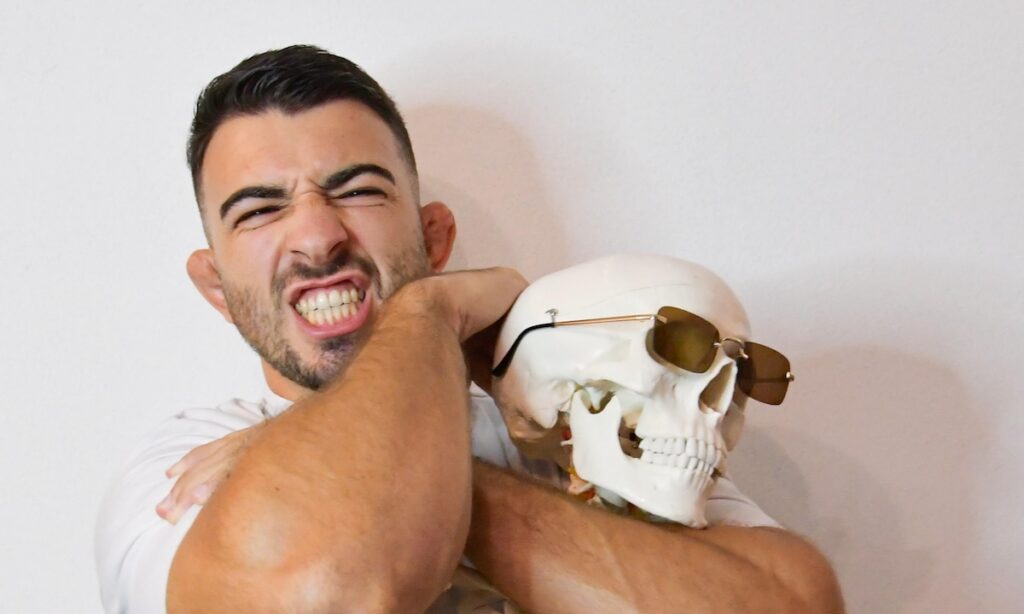Mickael Manera: the osteopath who teaches as much as he treats

At the Palazzo della Scala, the young practitioner is shaking up the codes of traditional osteopathy with a combination of rigorous science, psychology and an insatiable quest for knowledge.
Insatiable curiosity
“Why?” That is the question that has driven Mickael Manera since he was a child, and his all-consuming curiosity has taken him from the Berklee College of Music in Boston to his practice in Monte-Carlo. But between music and osteopathy, it was how humans function that truly intrigued him. “I’ve always been fascinated by how people function, whether psychologically, physiologically or bio-mechanically,” he says.
His atypical career path has made him a unique practitioner: three years of psychology at the University of Nice Sophia-Antipolis, where he discovered the neuroscience of pain, then five years of osteopathy at the Atman school, not forgetting his diploma as a sports coach. Nine years of studies that contributed towards a holistic vision of health.
A bio-psycho-social approach
Mickael Manera has made the therapeutic alliance his credo since opening his practice a year and a half ago. “You can’t look at an individual without taking into account their personal history, their previous medical issues, their environment,” he explains. This global approach, using a bio-psycho-social model, makes all the difference.
Unlike traditional osteopathy, his method is based on solid scientific foundations. DN4 questionnaires to identify neuropathic pain, Hamilton anxiety scales, mobility tests: each consultation becomes a meticulous investigation. “My aim is for them to come away more informed,” he stresses. Therapeutic education is not an optional extra, it’s at the heart of his practice.
Breaking down the myths
On Instagram, where his videos rack up millions of views, Mickael Manera is waging a battle against preconceived ideas. “You have to rest for 48 hours after an osteopathy session? Wrong! On the contrary, it’s good to get moving after a session,” he says.
Displaced vertebrae, pelvises that need to be realigned: these are all obsolete concepts that he dismisses through education. “A displaced vertebra means you have to go to hospital, surgery is necessary. We don’t put pelvises or vertebrae back into place.” His vision? The manipulations modulate pain through complex neurophysiological mechanisms, a far cry from the mechanistic explanations of yesteryear.
Chronic pain, his preferred field
His multidisciplinary approach comes into its own in the treatment of chronic pain. “With chronic pain, there are co-morbidities such as anxiety and depression. That’s part of the pain,” he says. Alarmism, the fear of moving that worsens the situation, then becomes a major therapeutic issue.
He tells the story of a patient suffering from a global anxiety disorder as the perfect illustration of his philosophy. Unable to leave her home, having given up her job, she found in him not just an osteopath, but an ally. “Thanks to my skills, listening to her and making her feel safe, we were able to find a solution. She was able to go back to work,” he says proudly.
Autonomy first and foremost
“I’m a solid crutch, but just a crutch,” says Mickael humbly. His goal? A single session is enough if the patient leaves informed, aware and with exercises to do at home. “The solution is not external, it is internal. These are the resources we need to bring into play.”
His philosophy extends to advice on how to manage chronic pain on a daily basis: regular exercise, good lifestyle habits, and above all, being exposed to stress. “Stress isn’t the problem, it’s resilience to stress. How do we cope with it? How do we build this resilience? This is the challenge facing our society today.”
Big ambitions
At 28, Mickael Manera has no intention of treading water. A two-year master’s degree, then a doctorate in psychology: fourteen years of studies in all. His dream is to develop an online coaching application, combining sport, mental health and pain management, to reach as many people as possible.
Day 1 in his practice, day 1 on Instagram: the synchronicity is no coincidence. “People like what I provide,” he says simply. In his quest for knowledge, Mickael Manera, who has been diagnosed as High Potential, has found his calling: to use each individual’s inner resources to transform their pain.











